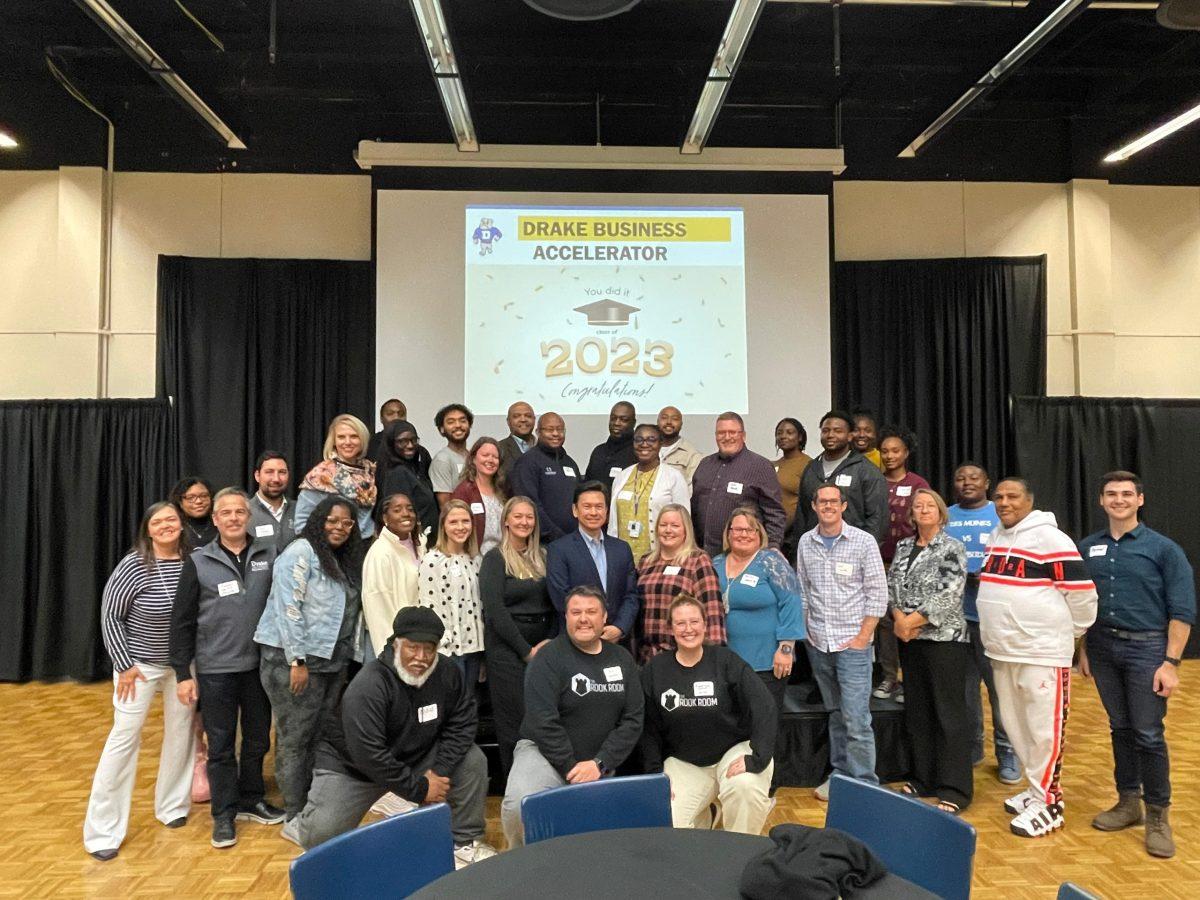The Business Accelerator Program in the Zimpleman College of Business helps budding businesses gain the skills to become full-fledged businesses in the Des Moines community.
“I applied for the Business Accelerator program because in our bustling city we need more ethnic and cultural options,” said Marvey Brown, co-owner of catering business Twinz Chicken in Des Moines, one of the businesses in this semester’s cohort. “I figured why not expand my knowledge and use the resources available in the community to expand and grow my business?”
The Business Accelerator Program has welcomed 49 clients into the second phase of the program. 19 other businesses completed the first phase, but chose not to move forward with the program because they gained the skills they were seeking from the first half, according to Paula Kueter, the director of the Buchanan Center for Entrepreneurial Leadership that oversees the program.
The program meets on Monday nights for 13 weeks throughout the fall or spring semester, culminating in a graduation ceremony where participants receive a certificate of completion and are welcome to invite their families. Past groups have learned in a virtual environment or hybrid model, but Kueter said this cohort chooses to meet in-person.
Kueter said the program is for a variety of businesses, including food trucks, nonprofits and even a cooperative seeking to provide doula services to Black and Hispanic expecting mothers — doulas provide guidance and support to expecting parents before and during the birthing process. The program is also open to a variety of clients, including current and former Drake students. The goal of the program is to support these businesses in growing their profits or customer base at no cost to them.
“We have businesses that come in that are currently grossing $2 million, and they want to go up to $4 or $5 million. [Some] go back through the program to add a product or get rid of a product,” Kueter said.
Kueter said each client works with a community mentor to grow the skills they need to grow their business. Some work on public speaking to pitch their product or service while others attend community networking events to learn how to be comfortable in that environment.
“It’s to help them get more acclimated into an environment that they want to be in or forced to be in,” Kueter said.
Brown said the program has given him skills to build his business model, attract his target audience and develop analysis about his competition.
“The combination of business professional mentors and student mentors…helped me identify my strengths and weaknesses, and encouraged me to take on new tasks,” Brown said.
Each participant works with a community mentor, who is an entrepreneur themselves, and a student mentor from Drake’s Changemakers Scholars program, who has taken the entrepreneurship introductory course to prepare them for this role. Sophomore Gunner Onkst is one of these student mentors.
“I think entrepreneurship is teaching me that it’s really what you want to do and highlighting your greatest strengths into providing a service to someone else,” Onkst said.
Onkst has provided a Gen Z perspective to Brown, the client they are partnered with this semester, and completed tasks for them, such as teaching Brown how to watermark photos that are used on social media with the business’ logo.
Brown, Onkst and Kueter all agreed that the Business Accelerator Program benefits Des Moines by bringing new businesses into the community.
“We always say that we want to support local, so I think [the Business Accelerator Program gives] people a platform to do that,” Onkst said.
Kueter said the program also changes the perception of Drake for clients who may think Drake is an inaccessible institution for marginalized communities.
“It puts [the Zimpleman College of Business] in a different light. It makes it more accessible. It makes it more community-driven, mission-driven, which is a little odd for business colleges,” Kueter said.
She said the main benefit, however, remains the opportunity to help businesses grow their opportunities.
“A lot of it is lifting. That’s what we really believe in — lifting people,” Kueter said. “It’s economic empowerment instead of economic development.”
Lily Wasserman contributed to reporting.








